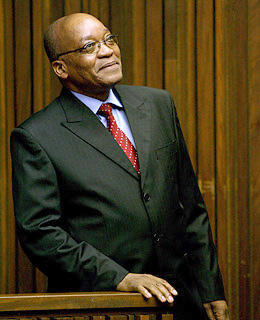
Jacob Zuma and Thabo Mbeki were once friends and allies, but they fell out around 2002, allegedly because Mbeki, South Africa's inscrutable President, suspected that Zuma was plotting to replace him. The power struggle that ensued was a peculiar affair, its very existence denied by the ruling African National Congress (ANC). When Zuma was dismissed from the deputy presidency and later charged with corruption and rape, his followers were convinced that their man was the victim of an Mbeki-inspired vendetta. (He was acquitted of the rape charges; the corruption charges are still being investigated.)
The controversies didn't hurt Zuma, 66, an unabashed populist who revels in traditional African polygamy—he has several wives—and whose massive rallies feature the Zulu anthem Bring Me My Machine Gun. His pro-poor rhetoric resonates with many ordinary South Africans who have not benefited from Mbeki's business-friendly policies. That explains how he easily trounced Mbeki in an internal vote last fall to become the ANC's chairman, a victory that has put him on track to win South Africa's presidency next year. Many party elders are horrified that such a man should step into shoes once occupied by Nelson Mandela, but they can't deny that he has achieved an African rarity: the peaceful overthrow of a powerful incumbent.
Malan is an award-winning South African author